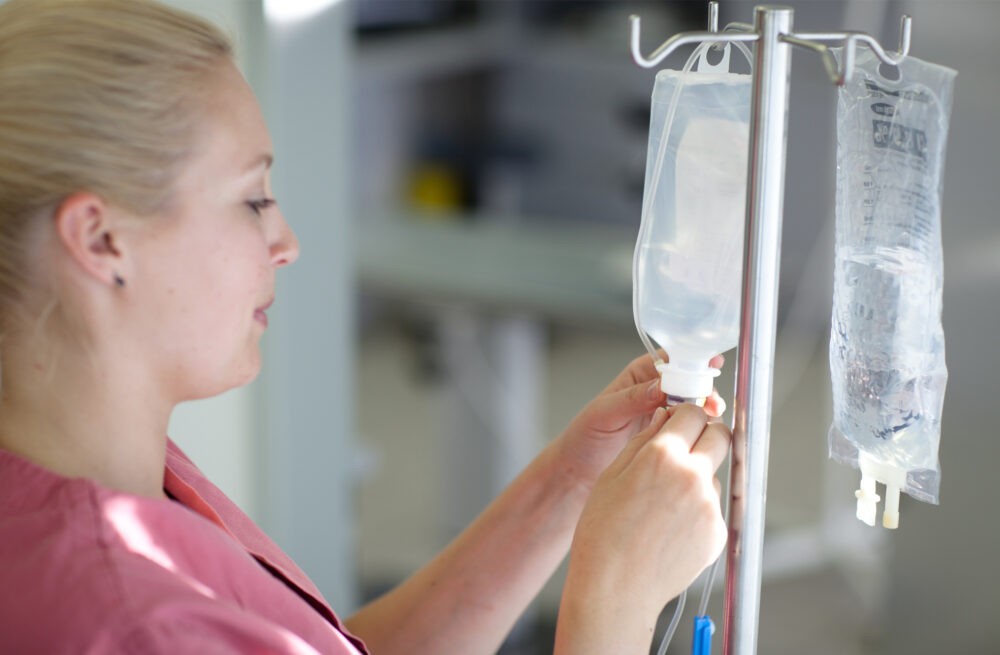At the Tri-County Regional Ethics Committee we hear about myths regarding artificial hydration and nutrition often. Below we have some of the most common myths we hear surrounding artificial hydration and nutrition, and the truth to those myths.
"Fluids, tube feeding and TPN save lives and can help all patients recover from illness."
Truth: While these methods of nutrition save lives and play a major role in recovery from surgery and protect patients against the transient and toxic effects of cancer treatment, these benefits are not demonstrated in the terminally ill patients.
"Dehydration and starvation lead to a very painful and unpleasant death."
Truth: While dehydration and starvation can be painful ways to die for otherwise healthy individuals, studies have shown that terminally ill patients do not suffer when artificial nutrition and hydration are withdrawn. In fact, it is hypothesized that advanced stages of dehydration may lead to the release of a compound from the brain which causes an analgesic effect. Ketones produced during starvation also produce an analgesic effect.
"There are no benefits to dehydration."
Truth: Dehydration allows for a series of physiologic changes which actually allow for increased comfort in a terminally ill patient. A decrease in urine output results in less need for a bedpan, commode or catheterization and fewer bed-wetting episodes. A decrease in gastrointestinal fluid leads to fewer bouts of vomiting. A decrease in pulmonary secretions leads to less coughing, choking and need for suctioning. Reducing the edematous layer surrounding a tumor diminishes the size of a tumor and reduces the associated pain and symptoms caused by the tumor. Reducing fluids leads to a decrease in painful ascites as well as fluid third spacing and general edema. Dehydration also allows for a decrease in wound and fistula drainage.
"Dehydrated patients feel thirst."
Truth: Studies have proved that dehydrated patients do not feel thirst. As long as the patient’s mouth is kept moist, he or she will not feel thirsty or uncomfortable.
"Artificial hydration allows the patient to live longer and spend more quality time with loved ones."
Truth: Studies have proved that dehydrating a patient does not shorten their life. Sustaining artificial fluids and nutrition requires intravenous lines, wires and pumps and sometimes restrain the patient so that he or she does not pull the lines out. These high-tech devices can be a barrier between the patient and the family and can take away from the closeness between patient and family at the time of death.
"Hydration will increase alertness and comfort at end-of-life."
Truth: While hydration may increase alertness, it decreases the amount of natural analgesics which are released in the blood. This will not only take away from the body’s natural analgesic effect but will make the patient more aware of the pain. Studies have revealed dehydrated patients are often more comfortable than those who are hydrated.
"Dehydrating a terminally ill patient causes abnormalities in blood chemistries and related symptoms."
Truth: Researchers have found surprisingly normal blood levels in dehydrated terminally ill patients.
"Starvation is inhumane and a form of punishment."
Truth: Our society traditionally views food and drink as a symbol of love, nurturing and caring. Food and drink are symbolic and a part of most cultural rituals. Providing food to those who are unable to feed themselves is often viewed as an act of nurturing, and taking food away is viewed as a form of depersonalization. In contrast, the withholding of these traditional symbols has been viewed as punishment reserved for social outcasts and misfits. It is for these reasons that it is so difficult for some families to withdraw nutrition. However, artificial nutrition and hydration are not the “normal” way of eating, it is the medical way and families often see it as antisocial. Withdrawing of nutrition and hydration is not punishment but a humane intervention since it has been shown to produce analgesic effects on the patient.
"Withdrawal of artificial nutrition and hydration is a form of euthanasia."
Truth: Withdrawal of nutrition and hydration is not euthanasia. Artificial nutrition and hydration are considered medical treatments. Patient and families have the right to refuse these treatments and it is not considered murder or suicide. It is the underlying disease that will kill the patient, not the withdrawal of artificial nutrition and hydration.
"Once artificial nutrition/hydration is started it cannot be stopped."
Truth: This statement is false. Stopping these treatments is both legally and ethically acceptable. The law requires that the treatment be terminated if the patient does not want it.
"The health care provider has the right to make decisions regarding withholding/withdrawing artificial hydration and nutrition."
Truth: If individuals have made their wishes known, the health care provider must honor these wishes. If he or she is uncomfortable with the situation, care can be transferred to another provider who will respect the patient’s decision.
"Once the nutrition/hydration are withdrawn or withheld, the patient will be abandoned by the health care team."
Truth: Withdrawal of nutrition/hydration is not synonymous with withdrawal of treatment. Patients still require symptom management and daily care to assure a comfortable death. This care can and should be provided regardless of nutrition and hydration status. It is considered unethical and unprofessional as well as illegal to neglect of abandon a patient.

